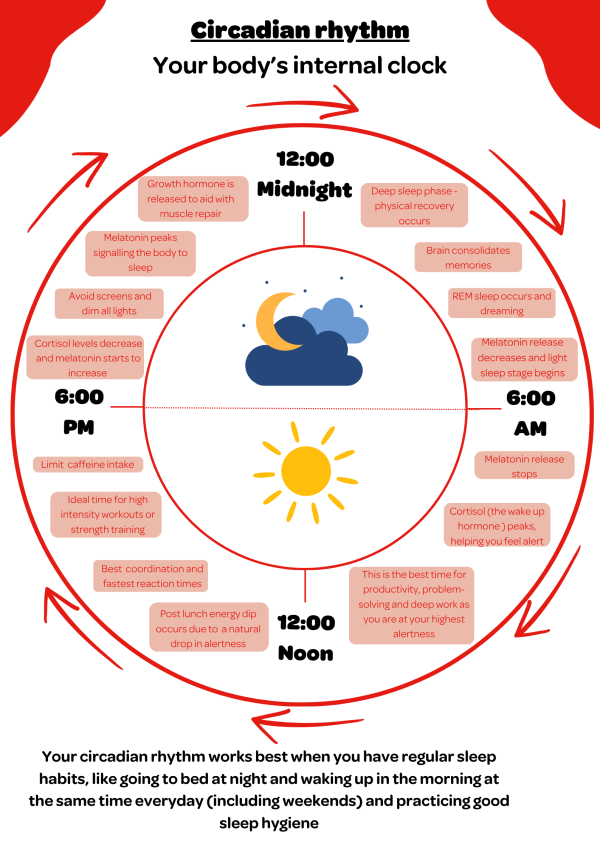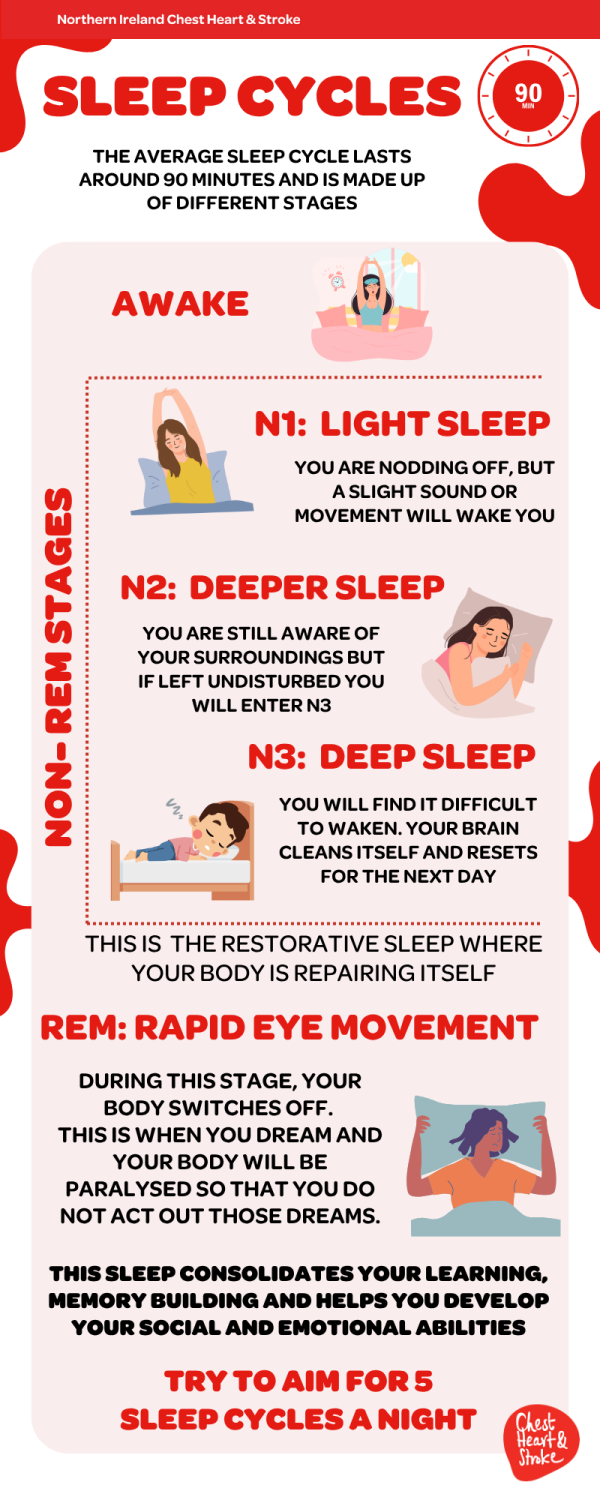
How much sleep do I need?
From the ages of 13 to 18 it is recommended to get around 8-10 hours of sleep a night.
Over the age of 18 it is recommended to get 7 or more hours of sleep a night.
Why is Sleep Important?
Heart Health
Sleep helps keep your heart healthy
A lack of sleep over a long period of time has been associated with an increased heart rate, higher blood pressure and higher levels of chemicals that cause inflammation in the body – all of which can put extra strain on your heart. When you get a good night's sleep this allows your heart rate and blood pressure to lower and in effect rest.
Blood Sugar
Poor sleep affects your blood sugar
Poor sleep can disrupt your body’s ability to regulate your blood sugar. If blood sugar levels increase this in time can lead to diabetes developing. Some studies have suggested that those who get less than 5 hours of sleep a night are more likely to develop diabetes. Therefore, it is important to get enough sleep to protect your heart health and reduce the risk of developing diabetes.
Immune System
Good sleep boosts your immune system
If you regularly do not get enough sleep, you may be more prone to catching the cold or flu as this can impact your immune system making it harder for your body to fight off infections. Therefore, make sure you are getting a good night sleep and have a regular bedtime routine.
Boosts Brain Power
Sleep improves your concentration and attention
A lack of sleep can impact your energy levels meaning you may find it harder to concentrate in class or even fall asleep during lessons. Therefore, it is important to get enough rest so that you feel recharged for the day ahead and are able to stay focused.
Sleep helps you learn and make memories
When you sleep your body has time to rest and repair. This is particularly important in terms of your brain – when you sleep your brain will organise and process all of the information you gathered during the day and converts short term memories into long term memories to help you learn. Therefore, getting a good night sleep is really important especially around exam season.
Helps you maintain a healthy weight.
Good sleep helps you maintain a healthy weight.
If you don’t get enough sleep, your body will need more energy as it is awake for a longer period of time. You are more likely to choose higher calorie food options later in the day, and if you feel tired you may have less energy to exercise or burn those extra calories off. Some studies have shown that people who get less than 7 hours of sleep a night are more likely to be overweight or obese than those who get 9 hours or more of sleep a night.
Stress Less
Helps improve your mental wellbeing and reduce stress
If you have a bad night sleep this can make you feel irritable, moody and stressed the next day. If this becomes a regular pattern, then this can have long term consequences including anxiety and depression. Therefore, it is important to get a good night sleep to keep a healthy mind and manage your stress levels.
Am I sleep deprived?
Signs that you may be sleep deprived include:
- feeling tired all of the time
- difficulty paying attention
- reduced alertness or reaction times
- mood changes e.g. stressed or irritable
- unplanned napping or falling asleep in class.

Your Internal Clock
Circadian Rhythm
Your circadian rhythm acts as a 24-hour internal clock working in the background of our brains and controls when you feel sleepy and alert.
As a child you have an early evening sleep schedule, but as you move into teenage years there is a shift in your circadian rhythm of two hours. So, before the release of the hormone melatonin that made you feel tired, around 8 or 9pm has now shifted to around 10/11pm. That does not mean that you cannot retrain your brain, but you need to make an effort to retrain your brain to make sure you reprogramme your circadian rhythm to ensure you get your 8-10 hours of sleep that you need a night.

Sleep Cycles
A sleep cycle is 90 minutes long and is made up of 5 stages. You need roughly 5 sleep cycles a night:
- The first stage is awake then you move into the 3 stages of non-rem sleep which is the restorative sleep phase, during these phases the heart rate, blood pressure and body temperature fall.
- N1 – this stage is the lightest form of sleep when you are nodding off to sleep. It - usually lasts between 5-10 minutes.
- N2 – is a deeper stage that usually lasts 20 minutes, and brain waves slowdown in preparation of going into a deep sleep.
- N3 – This is a deep sleep that lasts 20-40 minutes and it usually is hard to wake up and if awoken during it you will feel groggy and confused. This stage is needed for you to feel refreshed.
- REM (rapid eye movement) – this is the final stage in the cycle and happens about 90 minutes after falling asleep. This sleep is important for forming memories and establishing learning from the day, as well as processing emotions. During REM sleep you are more likely to have dreams, though the muscles are unable to move temporarily meaning you don’t act out your dreams.
Top Tips for a Good Night's Sleep
- Create a bedtime routine – try to be in bed by 10-10:30pm
- Use relaxation techniques, such as squared breathing or 5,4,3,2,1 technique (can we have those as a hyperlink to the videos included in the stress section)
- Avoid screen time – have no screen time at least one hour before you go to bed as the blue light from screens can reduce the body’s production of sleepy hormones
- Good sleep hygiene – dedicate an hour before you go to bed to wind down and relax, make sure your bedroom is a good temperature and quiet, avoid having sugary snacks or drinks before bed, have a consistent nighttime routine
- Be active – physical activity helps you to become a healthy kind of tired, allowing you to fall asleep quicker and wake up less during the night.
- Avoid caffeine after 3pm
- Try to include sleepy foods in your diet
Sleepy Foods
Click on the flip cards below to find out which foods to eat to get more sleepy ingredients in your diet!
Melatonin
This is the “sleepy hormone”. It helps to regulate your circadian rhythm. This improves sleep quality and helps you to fall asleep faster, stay asleep longer and reduces periods of wakening.
Sleepy Foods to Eat:
Eggs, fish, walnuts, cherries, tomatoes, peppers, cereals
Tryptophan
This is an amino acid which regulates sleep by increasing serotonin production, a hormone that when produced causes melatonin to release therefore helping to regulate your circadian rhythm and improve both sleep quantity and quality.
Sleepy Foods to Eat:
Oats, bananas, milk, pulses, turkey, almonds
Magnesium
This improves sleep quality by regulating the chemical messengers that are involved in calming the nervous system. Therefore helping your muscles to relax and reducing tension in the body. This also supports the production of melatonin.
Sleepy Foods to Eat:
Dark green leafy vegetables, nuts, seeds, pulses, salmon
-
Eight benefits of a good night’s sleep
Effect of Sleep Disturbances on Blood Pressure | Hypertension
Sleep, Health, and Society: From Aetiology to Public Health - Google Books
Sleep Deprivation - The Sleep Charity
Sleep deprivation and obesity in adults: a brief narrative review - PMC
Sleep Deprivation: Symptoms, Treatment, & Effects
Sleep, circadian rhythms, and delayed phase in adolescence - ScienceDirect
Sleepy foods
Meta-analysis: melatonin for the treatment of primary sleep disorders - PubMed

